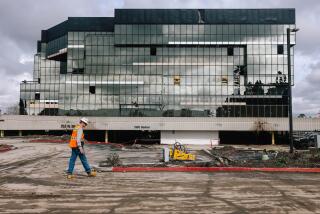Berkeley making the rounds to save its historic post office
BERKELEY, Calif. — Plenty of communities have resisted the U.S. Postal Service’s sweeping real estate sell-off, battling to keep open historic buildings that speak of bygone civic grandeur and to guarantee old-fashioned mail service for the public.
Few have succeeded.
But this is Berkeley, home of the Free Speech Movement and protracted protests over civil rights, Vietnam and more. So when the postal service announced plans to sell Berkeley’s 1914 Second Renaissance Revival-style main post office, decorated in New Deal-era art and situated in the heart of the liberal city’s Civic Center, the town rose up.
Opponents staged a 33-day encampment on its steps, and the mayor and entire City Council joined forces to block the sale, with backing from U.S. Rep. Barbara Lee (D-Oakland) and state legislators.
Now, as CBRE — the private entity that holds an exclusive contract to broker postal service real estate — pursues a call for bids, Berkeley leaders have played a new hand that could set a precedent for other communities. They are racing to impose a zoning overlay for the entire Civic Center district that would force any buyer to put the buildings there to public use, and largely block any profit-making endeavors.
Meanwhile, the council has voted unanimously to sue if a sale goes through.
“They didn’t really understand that we’re just not going gently into the night,” said Mayor Tom Bates. “People here are used to fighting for things they believe in.”
For Berkeleyites, the issues resonate: Loss of the public commons, a blow to the nation’s largest unionized workforce (40% of whom are minorities), with profits flowing to “the 1%.”
“This is a cynical attempt to strip public assets from communities for private gain,” Harvey Smith, an advisor to the UC Berkeley-based Living New Deal Project, recently told a packed Planning Commission meeting. “It’s a heist of our cultural heritage.”
The U.S. Postal Service has faced steep financial losses in recent years, due in significant part to a requirement imposed by Congress in 2006 that it prepay retiree healthcare obligations 75 years in advance.
Proposed legislation would repeal that requirement. But the postal service has held firm to a commitment to rid itself of underused and often aging real estate. Dozens of properties have sold over the last three years and 40 buildings nationwide are currently listed, Berkeley’s among them.
What the postal service probably had not bargained for, however, was a Berkeley-style offensive.
Riling many here is the exclusive deal with CBRE Group, whose chairman, Richard Blum, is married to U.S. Sen. Dianne Feinstein (D-Calif.).
A recent e-book by investigative journalist Peter Byrne details allegations of below-market sales to CBRE clients and investors. (CBRE has declined to comment on those claims.) A June audit by the Office of Inspector General raised unrelated “conflict of interest” concerns and noted “poor oversight” of the CBRE contract.
Protesters began amassing in mid-2012 when the Italianate downtown post office made a list of buildings targeted for possible sale.
David Welsh, 78, a postal employee for a quarter of a century and union leader with the National Assn. of Letter Carriers, was among the first to fight. He demonstrated outside Blum’s San Francisco office, took to Berkeley’s streets with a megaphone and last summer pushed for a more visible presence.
As a result, about a dozen tents flanked the post office for 33 nights. Volunteers delivered home-cooked meals. Musicians performed on the steps. And weekly movies played on a portable screen. (Among them: “The Postman,” a post-apocalyptic thriller in which a letter carrier saves the nation.)
Other residents packed public meetings. Among them was Moni T. Law, whose college-educated parents could not find employment in their native Alabama but like many African Americans climbed their way into the middle class as letter carriers in Los Angeles before launching other careers.
“It’s constitutionally required that we have a U.S. Postal Service,” Law, 53, who has fought the sale, said on a recent visit to the historic lobby. “It’s not a nicety.”
The City Council unanimously voted first to oppose the sale, and then to seek a one-year delay from the USPS in order to negotiate a compromise. (That bid was unsuccessful.)
State lawmakers, meanwhile, passed a resolution in September urging Congress to enact the Postal Protection Service Act of 2013, which would repeal the mandate to pre-fund retiree healthcare, allow the USPS to provide new services, prohibit cuts to Saturday service and keep historic post offices open.
Berkeley resident Jacquelyn McCormick opened another front. She scrambled to find a lawyer to fight the sale — and found former USPS legal counsel Harold Hughes. The result: creation of the National Post Office Collaborate, which recently won a preliminary injunction to block the sale of a historic post office in Stamford, Conn.
“All of this is home-grown from Berkeley,” McCormick said. “It’s a domino. Once something like this falls, what’s next, the national parks? If they’re not profitable, are we going to outsource those? At some point the government has to say, this is part of the fabric of who we are.”
Because the building is listed on the National Register of Historic Places, the USPS is required under the National Environmental Policy Act to assess whether a sale would have negative consequences. Postal officials have already determined that there would be none, and have proposed a covenant that would entrust an outside entity — possibly the city — to provide public access to the historic lobby.
“The building will remain protected,” said USPS spokesman Augustine Ruiz Jr., who added that “our first preference has always been to lease back the front end of the building … in the hopes to continue to provide retail service in its current location.”
Berkeley officials counter that the postal service should examine the potential effect of a sale on the entire Civic Center district, and contend that an environmental impact statement is legally required.
Critics also note that retail postal services have ended in other buildings that have been sold despite USPS pledges to maintain them. Public access required under the covenants, they add, is often starkly limited. For example, McCormick said, the provision for the recently sold Venice Post Office would allow visitors in six times a year, by appointment.
Ruiz said the postal service remains committed to marketing the property and has been “very open and transparent with the city and the Berkeley public from the very beginning. … We have communicated our concerns to the city both through outside counsel and through direct conversations. “
Elected leaders maintain that the USPS has acted “in bad faith” by disregarding the public’s wishes.
Bates, who has had two private conversations with the postmaster general, to no avail, said local leaders have been kept in the dark “like mushrooms. … If they would sit down and talk to us about what we want and we could come together, the process could be advantageous.”
If not, the city can erect plenty of roadblocks. Key among them is the zoning overlay, which comes before the full City Council in late January.
The voices here are not unanimous: Two urban planning groups as well as the Downtown Berkeley Assn. have warned that the overlay could scare away private investment from the Civic Center, where several historic buildings in need of seismic upgrades are already under-utilized.
But protesters are unmoved.
“Private money always trumps the public interest,” Welsh said. “We’ve kind of drawn a line in the sand.”
More to Read
Start your day right
Sign up for Essential California for news, features and recommendations from the L.A. Times and beyond in your inbox six days a week.
You may occasionally receive promotional content from the Los Angeles Times.







